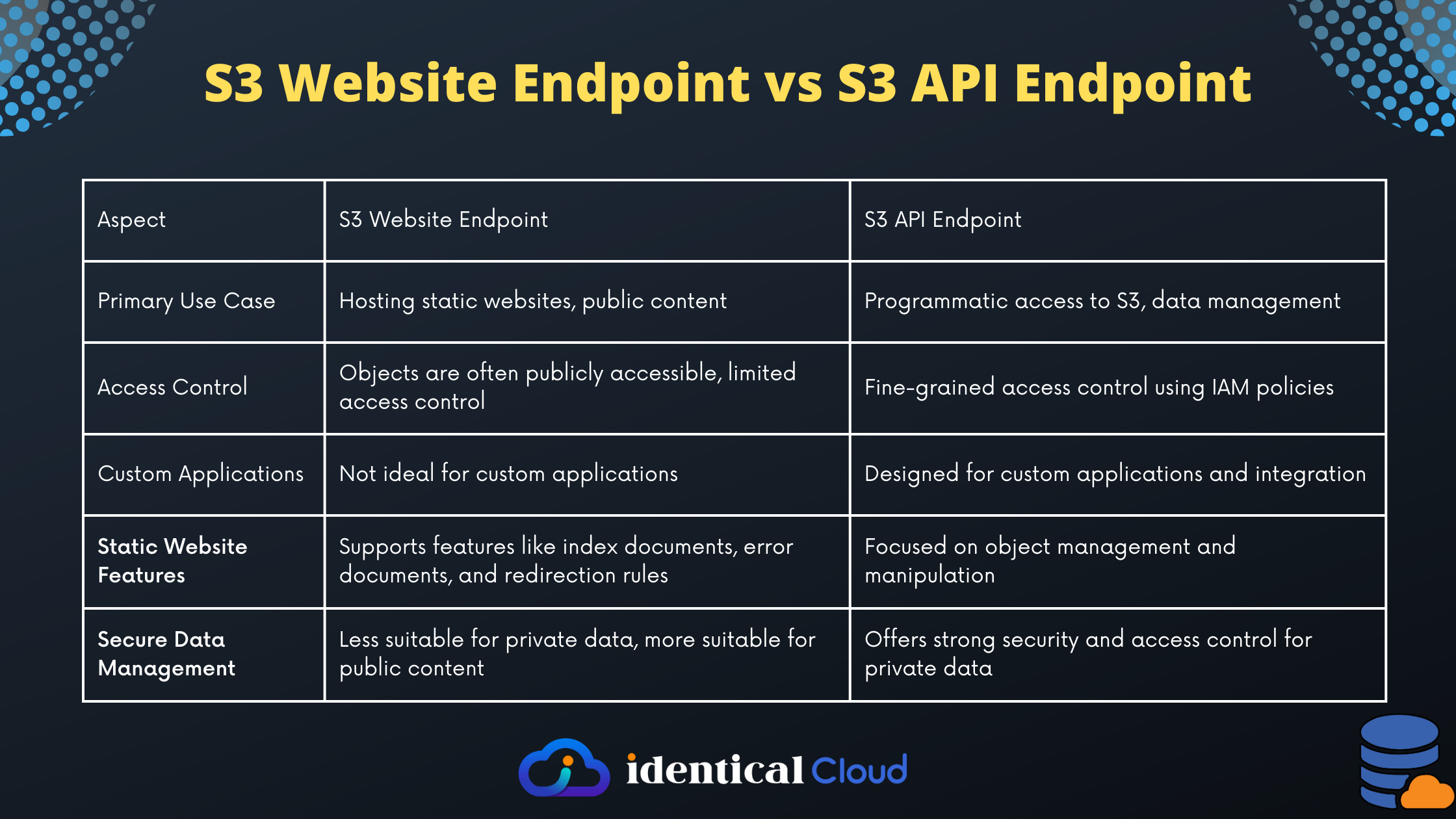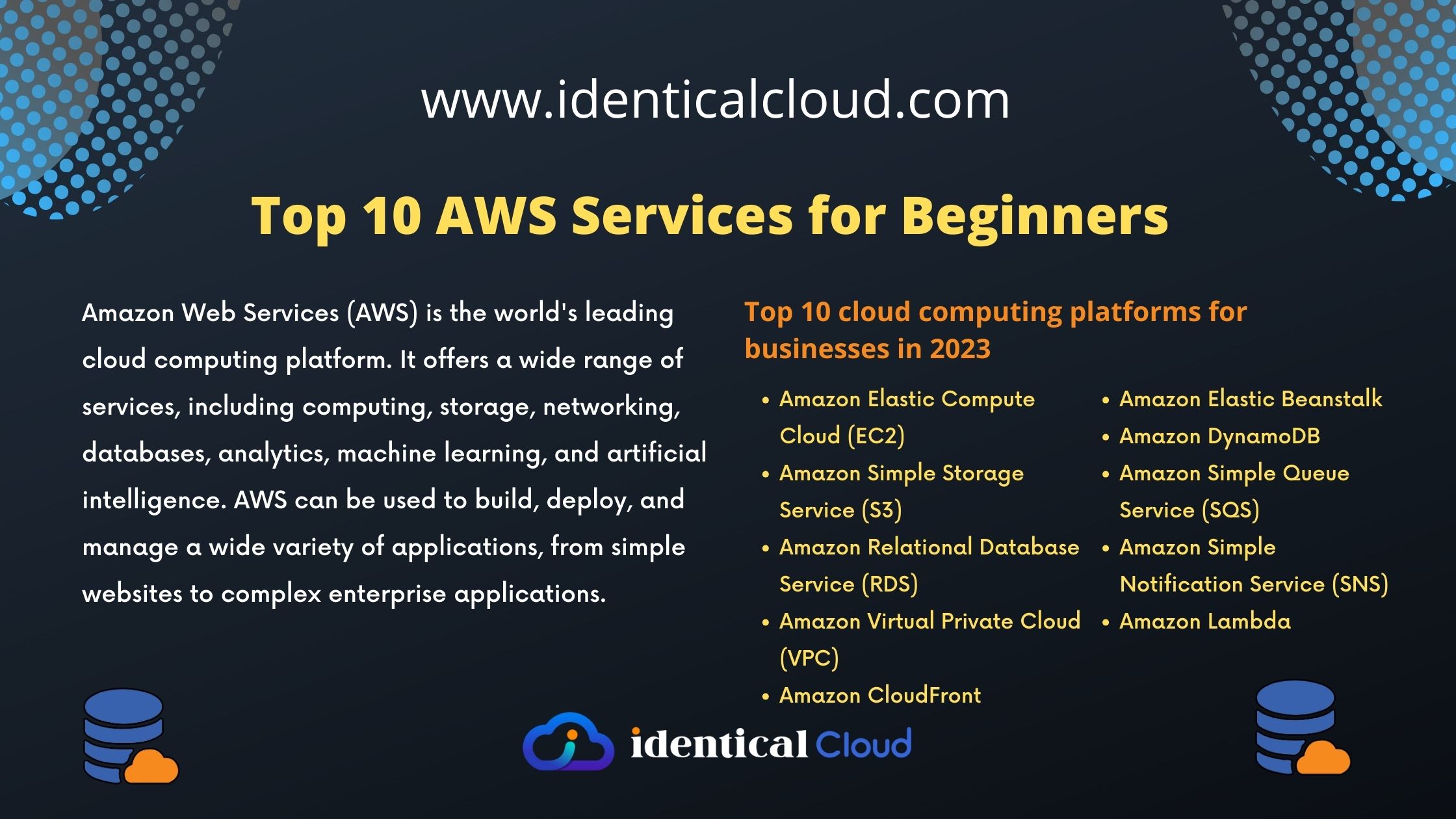
S3 Website Endpoint vs S3 API Endpoint: What’s the Difference?
S3 Website Endpoint vs S3 API Endpoint
Amazon S3 (Simple Storage Service) is a cloud-based object storage service that allows you to store, retrieve, and manage any amount of data from anywhere on the web. S3 provides two ways to access your data: through a website endpoint or through an API endpoint.
In this blog, we’ll explore the characteristics, use cases, and key differences between S3 Website Endpoints and S3 API Endpoints.
S3 API Endpoint
The S3 API Endpoint is the primary and default endpoint for accessing Amazon S3. It is designed for programmatic interactions with S3 buckets and is commonly used by developers and applications to perform tasks like uploading, downloading, and managing objects in S3.
Here are the key features and use cases of the S3 API Endpoint:
- Programmatic Access: The S3 API Endpoint is used for programmatic access to S3 using AWS SDKs, AWS CLI, and other third-party tools. This endpoint is ideal for developers who need to interact with S3 programmatically.
- Secure Access: Access to the S3 API Endpoint is secure, and it is governed by AWS Identity and Access Management (IAM) policies and permissions. You can control who has access to your S3 buckets and what actions they can perform.
- Data Management: It is the primary endpoint for managing objects in S3, such as uploading, downloading, listing, and deleting files. It supports a wide range of features like versioning, encryption, and lifecycle policies.
- Custom Applications: If you are building custom applications that interact with S3, you will likely use the S3 API Endpoint to integrate S3 functionality.
S3 Website Endpoint
The S3 Website Endpoint, on the other hand, is designed specifically for hosting static websites and making them accessible via a public URL. While you can serve static assets like HTML, CSS, JavaScript, and images through the S3 API Endpoint, the S3 Website Endpoint provides additional features tailored for web hosting.
Here are the key features and use cases of the S3 Website Endpoint:
- Static Website Hosting: The primary purpose of the S3 Website Endpoint is to host static websites. It is an excellent solution for hosting single-page applications (SPAs), blogs, documentation, and other web content that doesn’t require server-side processing.
- Public Access: Objects hosted on an S3 Website Endpoint are publicly accessible via a website URL. This makes it suitable for public-facing web content.
- Index Document: You can define a default index document (e.g.,
index.html) for your website. When a user accesses your website’s root URL, the S3 Website Endpoint serves this document. - Error Document: You can configure custom error documents to improve the user experience by displaying a user-friendly error page when something goes wrong.
- Redirection: S3 Website Endpoints support simple redirection rules, allowing you to redirect specific URLs to other locations.
Key differences between an S3 Website Endpoint vs S3 API Endpoint
Here are the key differences between an S3 Website Endpoint and an S3 API Endpoint presented in a table format:
| Aspect | S3 Website Endpoint | S3 API Endpoint |
| Primary Use Case | Hosting static websites, public content | Programmatic access to S3, data management |
| Access Control | Objects are often publicly accessible, limited access control | Fine-grained access control using IAM policies |
| Custom Applications | Not ideal for custom applications | Designed for custom applications and integration |
| Static Website Features | Supports features like index documents, error documents, and redirection rules | Focused on object management and manipulation |
| Default Access | Public access is the default setting | Requires explicit access control configuration |
| Secure Data Management | Less suitable for private data, more suitable for public content | Offers strong security and access control for private data |
These key differences should help you understand the distinct purposes and characteristics of S3 Website Endpoints and S3 API Endpoints within Amazon S3.
S3 website endpoints and S3 API endpoints are two different ways to access your S3 data. The best endpoint for you will depend on your needs. If you are simply looking to serve static website content, then you should use the website endpoint. If you need to access your S3 data using the S3 REST API, then you should use the API endpoint.








